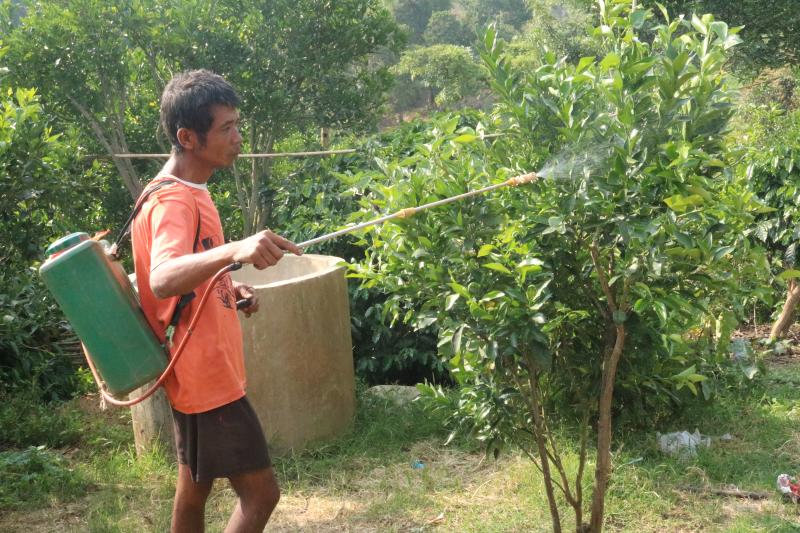by Ei Cherry
Agricultural officials and farmers in this fertile orange-growing area of southern Shan State are pushing for more investment in the citrus industry at a time when local and foreign aid groups are throwing their weight behind other ventures.
“These organizations have less of an interest in orange plantations,” said Kyaw Myo Than, an official with the Ywa Ngan Agricultural Department. “Perhaps it’s because the orange is a non-export item.”
Since Myanmar’s economic liberalization began in earnest in 2011, products such as coffee, tea, rice and textiles have benefitted and even reached foreign markets.
But other longstanding industries have not caught up and struggle to be competitive with imports.
Kyaw Myo Than said orange farmers increasingly need help with use of pesticides, fertilizers, choosing the right insect or disease resistant varieties before planting, and tending to old trees.
“The expenses will be high if the wrong variety is chosen,” he said.
Orange market
Maung Hmwe, a farmer in Ywa Ngan’s Mya Zedi village, said that the local agricultural department held a training course for orange growers, but implementing the measures would be costly and might pull resources away from other crops that need tending.
“So we cannot totally invest both the entire time and money in this business,” he said.
Khin Maung Zaw, vice chairman of the Orange Growers Association in Ywa Ngan, said capital investment in orange cultivation is relatively high due to costs for difference kinds of fertilizer, insecticides and anti-fungus spray.
The return on the investment is not always worth the trouble.
“Small-scale orange growers get only low profit as they lack agricultural knowledge and capital,” said Khin Maung Zaw, who has grown over 5,000 orange trees on 18 acres of land in Ye Oo Kyauk Myaung village. He suggested the government could help subsidize the necessary materials to increase output.
More than 80,000 people live in Ywa Ngan, and orange groves stretch over 3,000 acres, according to official statistics. Once picked, the oranges are sent to markets in Yangon, Naypyitaw and Aung Pan, a town near Taunggyi, the capital of Shan State.
Zaw Linn Htet, whose orange grove in Mya Zedi village is one and a half acres, said the local price depends on market demand, but that the government should try to help farmers find foreign buyers for the fruit.
Ohn Myint, a deputy officer with the Ywa Ngan Agricultural Department, said improved planting techniques are also needed.
“Rather than using chemicals for the trees, natural methods should be used. Rather than chemical fertilizers, natural fertilizers such as manure should be used,” he said.
Value added produce
Zaw Linn Htet, another farmer from Mya Zedi, said turning to sales of fresh juice could help diversify the market. He added that investors could build factories to do the processing.
“In some years, we could not sell our oranges due to the lack of market demand. In these circumstances, we have to just look at piles of [unsold] fruit. We don’t want to see these oranges go bad,” he said. “Even if we bring the fruit to the market by ourselves, the income will not cover the transportation charges. If orange juice factories are set up in our region, we could send the fruit to these factories directly.”
In addition, he said, orange growers could obtain organic certification, which could lay the ground for sales abroad.
But Myo Win Oo, a farmer from Myine village, said the unregulated use of chemical fertilizer needed to be reigned in as part of the development of the industry before any kind of expansion.
“The farmers need to monitor both the quantity and the quality of their crops.”
This story was originally published by Myanmar Now on May 26, 2017.





Reader Interactions